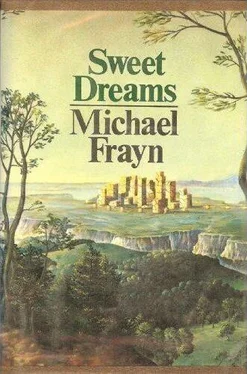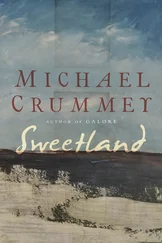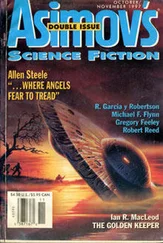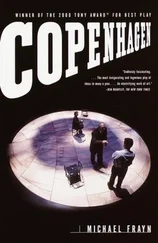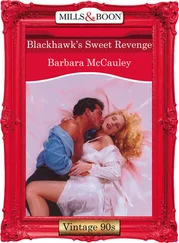On an impulse he leans across and takes a bite out of her right-hand buttock. It is just as he had imagined — crisp, sweet, and juicy. Her lips curl back from her teeth with pleasure. She takes his hand, and gently crushes each of his fingers in turn between her lips, like buttered asparagus.
Matthew, the six-year-old, leans against Howard’s chair, scuffing his feet about and reading from his Janet-and-John book, On We Plod .
“Janet and John go for a walk,” he reads. “They go for a walk with their father. Who is this they see? It is Tim and Topsy. Tim and Topsy are going for a walk, too. They are going for a walk with their father.”
“Good,” says Howard, thinking about tea-time.
“‘Hello, Tim and Topsy,’ say Janet and John.
“‘Hello, Janet and John,’ say Tim and Topsy.
“‘Hello, Mr…. Aeroplane …’”
Howard squints over his son’s shoulder.
“‘Hello, Mr. Wayland,’ ” he prompts. “Mr. Wayland! That’s funny. We know someone called Mr. Wayland, don’t we?”
“‘Hello, Mr. Wayland,’ says Father,” reads Matthew.
“‘Hello, Mr. Um,’ says Mr. Wayland.”
Howard looks over Matthew’s shoulder again. He bursts out laughing.
“What?” demands Matthew suspiciously.
“Nothing. That’s right! Mr. Um. It’s very funny, that’s all. Felicity, can you hear this? Go on, Matt.”
“See,” reads Matthew, “Mr. Wayland has forgotten their names. Mr. Wayland is not good at remembering things. Father is good at remembering things. Janet and John are good at remembering things. Even Tim and Topsy are good at remembering things.
“See, Mr. Wayland has a funny look on his face. He thinks a friend will come along. He thinks his friend will not know Father. He thinks he will have to say, ‘Do you know Mr. Um?’ ”
Howard laughs.
“Are you listening to this, Felicity?” he asks.
“He thinks that Father will be sad,” reads Matthew. “He thinks that Janet and John will be sad.
“But Janet and John do not care whether Mr. Wayland knows their name. They do not care fourpence. Father does not care. He does not care fivepence.
“Here are Pat and Pete. They are out for a walk with their father.
“See, now Mr. Wayland is running away.
“‘Good-bye, Mr. Wayland. Good-bye, Tim. Good-bye, Topsy.’”
Matthew puts his marker in and closes the book. Howard runs his hand through the boy’s hair.
“Very well read, Matt.” he says. “Isn’t he getting on well, Flic?”
Matthew makes his clumsy face, and moves his feet about.
“That’s what I think is so good about this school,” says Howard to Felicity. “They give them stuff to read which has really got some relevance to the children’s life. Michael Wayland is an actual figure in their mythology.”
“They didn’t give them that,” says Felicity. She is intent upon the picture she is painting, a luminous, finely detailed portrait of a myoglobin molecule. “Matt wrote it.”
“What?” says Howard, not understanding.
“Me and another boy,” says Matthew. “It was our project. But Miss Sinclair had to help us, because we couldn’t spell ‘Mr. Wayland.’ ”
“How do you mean, you wrote this?” demands Howard, taking the book and turning it over in his hands. “It’s printed! It’s published by Ginn and Company, Educational Publishers!”
“Yes, well,” says Matthew, “me and Kevin Williams writ it — that was our project. Then two of the girls, Alexandra Saunders and Karen Holt, their project was to be literary agents and find a publisher for it.”
Howard gazes at Matthew tenderly. He has underestimated him.
“What?” demands Matthew, frowning, and turning his feet over sideways.
Downstairs the ten-year-old and the eight-year-old are quietly occupied in running three of the old dungeons together to make a games room. Upstairs in the nursery the baby is tearing up The Anatomy of Melancholy , and eating it page by page.
They’re good kids.
For dinner they have taramasalata, gigot aux haricots , and apple crumble. They eat outside on the terrace, it’s so warm, by candlelight, with the lights of the city spread out in front of them — a sea of lights, twinkling in the uneven layers of warm air like a still sea shimmering and glittering. Currents move in the sea — the lights of traffic streams flowing and eddying. Somewhere beyond the city brush-fires are burning, hazing the horizon, and lighting the haze with a faint uneven reddish glow.
“They’ve got three thousand firemen up there in the hills,” says Felicity, watching it all dreamily. “There was something about it on the news. A lot of people have lost their homes.”
The moon comes up through the smoke, pale copper, veined, enormous.
It’s very peaceful.
Just as Howard is scraping the last spoonful of apple crumble out of the bowl, a thought strikes him. He gazes at Felicity in astonishment, his mouth open, the scraping spoon in his hand stilled.
“What’s the matter?” says Felicity, alarmed.
“I’ve just remembered something …”
But how can he ever have forgotten it? Was it the Chases’ dinner party that put it out of his mind? Or the sunlight on the terrace all day? Or the warm golden fatness of the drenched haricot beans, and the pale smoky moon?
“I’m in love!” he explains.
Felicity gazes at him, her eyes wide open.
“I can’t eat,” says Howard. “I just have this terrible fluttering in my stomach the whole time. I can’t sleep. I don’t know what’s happening to me — I feel as if I’m walking round in a dream. If I’m not careful I’m going to step in front of a car, or something.”
Felicity goes on staring at him in astonishment. Then she takes his hand.
“Poor love!” she says. “Why didn’t you tell me before?”
“I forgot.”
“You must be exhausted. Go and lie down. I’ll bring you an aspirin and whisky.”
“I can’t lie down!” cries Howard. “I can’t even sit down!”
He jumps up and begins to walk up and down the terrace. Felicity watches him with her eyebrows raised in an expression of tender, slightly comical concern.
“I’m sorry,” he says, running his hand desperately through his hair. “I didn’t mean to shout. It’s not your fault. I don’t know where I am with this girl, that’s the trouble. One moment she’s kissing me, and the next she’s telling me she can’t see me till next week. One day I’m walking with her beside the river, and I’ve got my arm round her shoulders, and she’s put her arm round my waist, and we laugh at everything, and stop every few yards to kiss, and I think, This is fantastic! It can’t go on like this! And it doesn’t, because she suddenly rushes off, and I have to run after her, shouting about when am I going to see her again, and jumping out of people’s way into the gutter.”
Felicity laughs.
“You’ll just have to be firm with her,” she says. “Sweep her off her feet.”
“I keep sweeping her off her feet,” he complains. “But then she keeps getting back on them again.”
“You always dealt with me quite effectively.”
“But I knew where I was with you!” he says irritably. “You’re a completely different sort of person!”
She sits in silence, smiling to herself. He leans over the rail of the terrace, moodily banging his knuckles against the bricks.
“Sorry,” he says finally. “But you must see I’m a bit on edge. It’s no good making fatuous suggestions…. It would be better if you concentrated on sewing some buttons on my shirts. Half my shirts have got buttons missing now! How can I go out and pursue a love-affair wearing a shirt with no buttons on it! What on earth is she going to think? No wonder I’m not getting anywhere when I have to spend half my time holding my tie in place to cover the gap! I get no support, that’s the trouble. I have to do every damned thing for myself. Other men’s wives try to help them a little. They take pride in their husband’s success….“
Читать дальше
